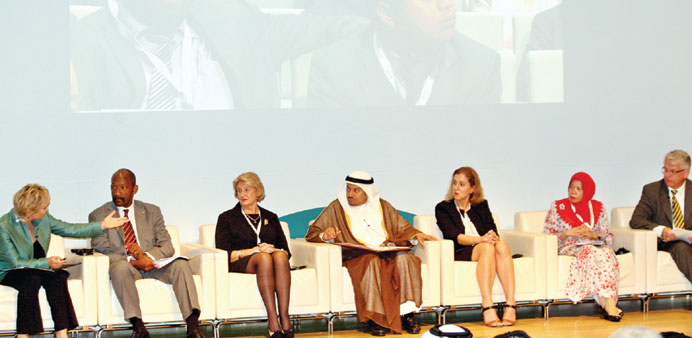|
The culture and heritage of Qatar is very sensitive to family issues and put it in the forefront of all development efforts in the country, HE Dr Abdullah Saleh Mubarak al-Khulaifi, the Minister of Labour and Social Affairs, has stressed. |
Speaking during a discussion at the Doha International Conference yesterday, he explained that Qatar has a considerable number of civil society organisations to support the Ministry of Labour in this regard.
“We are aware of the threats the concept of family is facing the world over. Accordingly, supporting the well-being of the family is at the heart of the ministry’s priorities,” he said at the two-day conference organised by the Doha International Family Institute.
“We, in Qatar, focus on women’s education. We invest in empowering families and have seen the benefits of this, almost 75% of women are educated and women constitute a considerable workforce in the country,” HE the Minister explained.
“Our social agenda got a big chunk of the country’s budget as education and health is allocated around 30% of this year’s budget. We also have a big focus on social services and our efforts and activities in this are well advanced and clear,” he pointed out.
HE Dr al-Khulaifi stressed that the sanctity of marriage and family is stressed in the Qatari constitution and it is also a steadfast belief in both the Islamic creed and Qatari traditions. Further, the relevant laws and legislations of the country reflect this.
Meanwhile, he stressed that though the religious and traditional values of the Qatari society are well-preserved within the local community, it is a community that has always been know for its openness, tolerance and acceptance of others, respecting their values and traditions. He said this is not a new trend in the local society but has always been the case even during the old times, witnessed through the various trade trips and business transactions of the inhabitants with other countries.
Other speakers in the panel session, “Families Matter”, were Vincent Meriton, Minister for Community, Social Affairs and Sports, Seychelles; Y B Datuk Azizah Mohd Dun, Deputy Minister of Women, Family and Community Development, Malaysia; Dr Tuve Martin Hugo Shankberg von Beetzen, Swedish Parliament member; Dr Bahira Sherif Trask, professor, associate chair, Department of Human Development and Family Studies, University of Delware; and Dr Deisi Noeli Weber Kusztra, president of World Family Organisation.
The speakers agreed that policy and decision makers should consider family unity as their prime responsibility and consider the economic implications of failure of the family.
Dr Von Beetzen said the base of the society is not the individual, but the family. “When children get raised and educated, they grow up acquiring their manners, values, beliefs and trends from their parents,” he stressed, adding that family values should be enforced - women, men and children should be allowed to play their social roles in a secure and well-protected environment.
The speakers further stressed that governments should support families and encourage them to produce children and educate them accordingly through various social services and security mechanisms and strategies.

